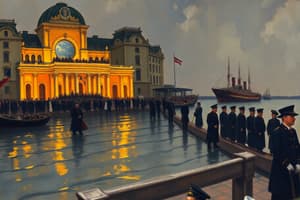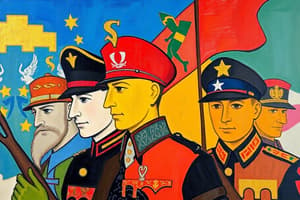Podcast
Questions and Answers
Quin país va invadir Bèlgica durant la Primera Guerra Mundial?
Quin país va invadir Bèlgica durant la Primera Guerra Mundial?
Alemanya
Quin país va enviar un telegrama a Mèxic per incitar-lo a declarar la guerra als Estats Units durant la Primera Guerra Mundial?
Quin país va enviar un telegrama a Mèxic per incitar-lo a declarar la guerra als Estats Units durant la Primera Guerra Mundial?
Alemanya
Quins territoris aspirava a obtenir el Regne d'Itàlia durant la Primera Guerra Mundial?
Quins territoris aspirava a obtenir el Regne d'Itàlia durant la Primera Guerra Mundial?
Transsilvània, Trentino, Trieste i Dalmàcia
Quin país va ser invadit per Austria-Hongria com a part dels esdeveniments que van conduir a la Primera Guerra Mundial?
Quin país va ser invadit per Austria-Hongria com a part dels esdeveniments que van conduir a la Primera Guerra Mundial?
Quin país va tenir rivalitats per la hegemonia en els Balcans durant la Primera Guerra Mundial?
Quin país va tenir rivalitats per la hegemonia en els Balcans durant la Primera Guerra Mundial?
Els aliats es van enfrontar a ________ (Austria-Hongria)
Els aliats es van enfrontar a ________ (Austria-Hongria)
La rivalitat per la hegemonia als Balcans va ser un factor ________
La rivalitat per la hegemonia als Balcans va ser un factor ________
Els països es negaven a desmobilitzar les seves tropes, creant una situació de ________
Els països es negaven a desmobilitzar les seves tropes, creant una situació de ________
La ________ de Bèlgica, un país neutral, va desencadenar tensions
La ________ de Bèlgica, un país neutral, va desencadenar tensions
Les promeses ________ van ser una causa de conflicte
Les promeses ________ van ser una causa de conflicte
Flashcards are hidden until you start studying
Study Notes
Causes of World War I and Imperialism in the 19th Century
The onset of World War I, a conflict that shook the foundations of the global order, can be traced back to a complex web of intertwined factors. One of the most significant contributors to this storm was the rise of imperialism during the 19th century. This section will delve into the primary causes of World War I, with a particular focus on imperialism and its impact during that era.
Nationalism
Nationalist sentiment, fostered by the growth of democracy and a desire for self-determination, contributed significantly to the tensions that eventually led to war. The idea of a nation-state, where political boundaries align with ethnic and linguistic groups, created a "national question" in the territories that encompassed diverse populations, such as the Austro-Hungarian Empire and the Ottoman Empire. The desire for independence among these groups would play a significant role in the events leading to war.
Imperialism
Imperialism, the practice of one country extending its power and influence over other territories, played a critical role in the dynamics of World War I. During the 19th century, European powers, such as Germany, Great Britain, France, Russia, and Austria-Hungary, established vast empires across the world, particularly in Africa and Asia. This competition for territory and resources led to a climate of mistrust and antagonism, as smaller powers felt threatened by the growing influence of their larger neighbors.
The Scramble for Africa
One of the most prominent examples of imperialist competition was the "Scramble for Africa," which saw European powers carving up the continent among themselves, largely disregarding the local populations and their rights to self-determination. This race for territory and resources led to increased tensions between European powers, particularly Germany, which felt excluded from the colonial spoils.
Arms Race
The build-up of military powers among the European nations fueled an arms race, as each aspired to greater military might to defend their territories and project their influence globally. This dangerous cycle of militarization created a climate of heightened hostilities and fear, laying the groundwork for the escalation of tensions leading up to war.
Alliances
The complex web of alliances that emerged in the decades before World War I further fueled the tensions that eventually led to war. The Triple Entente, comprised of France, Russia, and Great Britain, and the Triple Alliance, comprised of Germany, Austria-Hungary, and Italy, formed a network of mutual defense agreements that were based in large part on imperialist ambitions. These alliances created a climate of fear and suspicion, as smaller nations felt trapped between the competing blocs.
Assassination of Archduke Franz Ferdinand
The assassination of Archduke Franz Ferdinand of Austria-Hungary, a direct causal link to the onset of World War I, can be traced back to the underlying issues discussed above. Gavrilo Princip, a Serbian nationalist, shot and killed Franz Ferdinand on June 28, 1914. This event, combined with the complex climate of tensions and distrust that dominated the region and the world, led to a rapid escalation of events that culminated in the outbreak of war.
The map below illustrates the extent of European imperialism in the late 19th century, highlighting the diverse territories under European control. This map vividly demonstrates the competition and rivalry that fueled the tensions and conflicts that eventually led to World War I.
![Imperialism in the 19th Century]: https://www.britannica.com/event/World-War-I/Causes: https://www.history.com/topics/world-war-i/causes-of-world-war-i: https://www.history.com/topics/world-war-i/scramble-for-africa: https://www.britannica.com/event/World-War-I/Causes: https://www.britannica.com/event/World-War-I/Causes: https://www.history.com/topics/world-war-i/causes-of-world-war-i: https://upload.wikimedia.org/wikipedia/commons/thumb/e/e4/European_colonial_empire_1914.svg/1200px-European_colonial_empire_1914.svg.png: https://upload.wikimedia.org/wikipedia/commons/thumb/e/e4/European_colonial_empire_1914.svg/1200px-European_colonial_empire_1914.svg.png
Studying That Suits You
Use AI to generate personalized quizzes and flashcards to suit your learning preferences.




